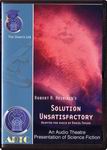
 The Aftermath: Book Four of The Asteroid Wars
The Aftermath: Book Four of The Asteroid Wars
By Ben Bova; Read by Emily Janice Card, Gabrielle de Cuir, Stephen Hoye, and Stefan Rudnicki
10 CDs – 12 Hours [UNABRIDGED]
Publisher: Audio Renaissance
Published: 2007
ISBN: 1427201064
Themes: / Science Fiction / Space Travel / Asteroid Belt / Politics / War / Survival /
I really enjoy Ben Bova’s vision of humanity’s future in space. That vision is contained in all of his Grand Tour books, and the Asteroid Wars books are part of that larger series. The Aftermath is the fourth, and possibly the last, Asteroid Wars novel. Bova’s future is well considered, and that’s part of the fun of reading his books. To get artificial gravity, a part of the ship needs to spin. Resources are limited. Problems arise – frustrating ones, like when you’ve climbed a ladder to do a job and realize that you’ve forgotten the tool you need to do that job. Only in space, you can’t climb down and get that tool. You have to figure something else.
The Zacharias family finds this out the hard way, because the four of them, who run a merchant vessel as a family business, find themselves ready to dock at what turns out to be a military target during the Asteroid War. When they discover their mistake, Victor Zacharias, the father, leaves the ship in a pod in an attempt to lure attackers away, and the rest of the family gets out of there, but not before their ship is damaged, and not before committing to a trajectory that will keep them away from civilization for years.
Victor then finds himself on the attacked habitat in a state of near-slavery while his family does what it can to stabilize their ship and ride out the years in solitude. The story focuses on both of those situations – Victor’s, who never really loses hope, and the family’s, who struggle. In this way, Bova gives us a story of peripheral damage in war.
The audiobook is read by multiple narrators, switching as the point of view of the story shifts. All of the narrators are top-notch, and the style works well with the book. I was particularly enamored with the opening of the book, as the family is introduced, then tossed into peril. Bova’s characters are well-drawn, and the narrators took full advantage in their effective story-telling.
Posted by Scott D. Danielson

 Guess what today is? Yup, it’s Red Monday! That countdown clock website turned out to mean something after all! I got this chilling email early this morning…
Guess what today is? Yup, it’s Red Monday! That countdown clock website turned out to mean something after all! I got this chilling email early this morning…








